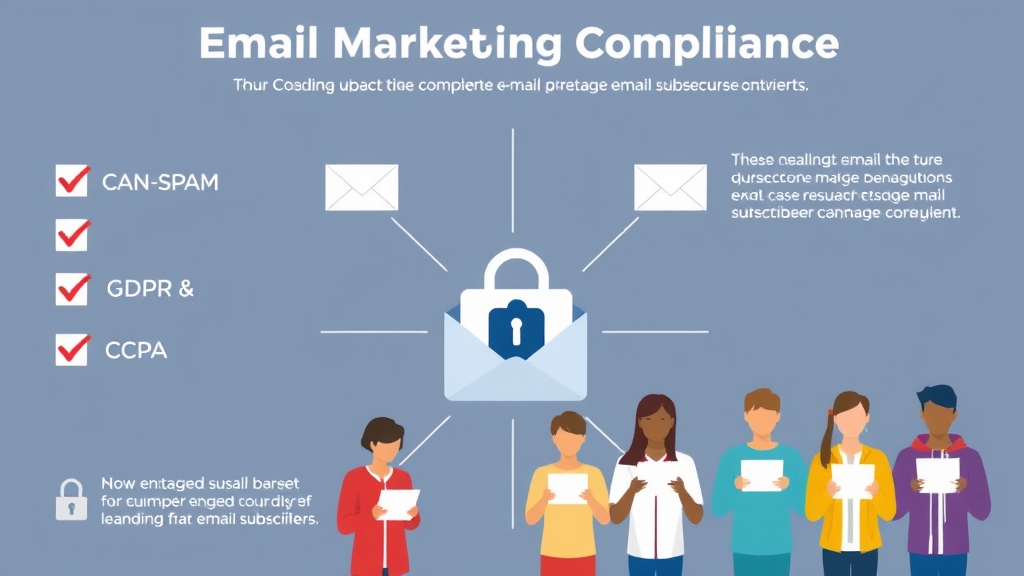Email Marketing Compliance: A Complete Guide for Businesses
Email marketing is an essential tool for many businesses, allowing you to connect directly with your audience. However, it’s vital to ensure that your email marketing efforts are compliant with various regulations. This guide will help you understand email marketing compliance and how to navigate it effectively.
Understanding Email Marketing Compliance
What is Email Marketing Compliance?
Email marketing compliance refers to the legal requirements that govern how businesses can collect, store, and use personal information in their email campaigns. These rules vary by country and state but generally focus on obtaining consent from subscribers, protecting their data, and giving them control over their information.
Importance of Compliance in Email Marketing
Complying with email marketing laws is essential for several reasons. First and foremost, it helps protect your business from legal issues and potential fines. Additionally, being compliant builds trust with your subscribers. When people feel safe sharing their information with you, they are more likely to engage with your content and ultimately convert into customers.
Key Regulations to Know
The CAN-SPAM Act
In the United States, the CAN-SPAM Act sets the standard for commercial email messages. It requires that you include a clear opt-out method in every email you send. Your subject lines must not be misleading, and you need to identify yourself as the sender clearly. Failure to comply can lead to significant penalties.
The General Data Protection Regulation (GDPR)
If you’re doing business in or targeting customers in Europe, you’ll need to comply with GDPR. This regulation requires explicit consent before collecting personal data and gives individuals greater control over their information. Businesses must be transparent about how they use data and provide clear options for users to withdraw consent.
The California Consumer Privacy Act (CCPA)
The CCPA enhances privacy rights for residents of California. It requires businesses to inform consumers about what personal data they collect and how it’s used. Under this law, consumers have the right to request deletion of their data or opt-out of its sale.
Best Practices for Achieving Compliance
Obtaining Explicit Consent
One of the most crucial aspects of compliance is obtaining explicit consent from your subscribers before sending any emails. This means they should actively agree (for example, by checking a box) rather than being automatically signed up through pre-checked boxes.
Crafting Clear Opt-In Processes
Your opt-in process should be straightforward and transparent. Use simple language that explains what subscribers can expect from your emails—such as frequency and content type—so they know exactly what they’re signing up for.
Providing Easy Unsubscribe Options
Every email you send should include an easy way for recipients to unsubscribe if they choose to do so. This not only keeps you compliant but also shows respect for your audience’s preferences.
Building and Maintaining a Compliant Email List
Segmentation and Targeting Strategies
Segmentation involves dividing your email list into specific groups based on interests or behaviors so that you can send targeted content relevant to each group. This approach improves engagement rates while helping maintain compliance since recipients are more likely interested in receiving those emails.
Regularly Cleaning Your Email List
Cleaning your email list regularly means removing inactive subscribers or those who have unsubscribed. Keeping an updated list helps improve engagement rates while ensuring compliance with laws requiring accurate records of consent.
Managing Subscriber Preferences
Allowing subscribers to manage their preferences regarding which emails they receive (like newsletters versus promotional offers) promotes transparency while enhancing user experience.
Creating Compliant Email Content
Creating compliant content is just as important as following regulations during sign-up processes.
Essential Elements of a Compliant Email
Subject Lines and Transparency
Your subject lines must accurately reflect the content within the email without being misleading or deceptive; otherwise, this could violate regulations like CAN-SPAM or GDPR guidelines.
Accurate Sender Information
Always provide accurate sender details so recipients know who they’re communicating with; this builds trust between you and your audience while complying with legal standards requiring sender identification.
Clear Identifiers for Promotional Content
Make sure promotional messages are clearly indicated within your communications; this will not only keep readers informed but also aligns with regulations demanding transparency about advertising content.
Monitoring and Reporting Compliance Issues
Keeping track of compliance issues is crucial once you’ve implemented best practices:
Tools for Tracking Compliance Metrics
Utilize tools designed specifically for tracking metrics related specifically towards compliance such as unsubscribe rates or complaint ratios; these insights help identify areas needing improvement along ensuring adherence towards laws governing emailing practices!
Responding to Complaints and Inquiries
When complaints arise—whether through unsubscribes—or inquiries regarding privacy—address them promptly! Being responsive reduces negative impacts on reputation while showing commitment towards maintaining standards expected by both regulators & audiences alike!
Consequences of Non-Compliance
Understanding what could happen if non-compliance occurs helps emphasize its importance:
Legal Penalties and Fines
Violating laws such as CAN-SPAM or GDPR could result in hefty fines; these penalties vary based upon severity but could run into thousands per violation! Not only does this affect finances directly—but damages reputations irreversibly too!
Impact on Brand Reputation
Failing at adhering towards proper standards leads customers losing trust over time—their perception becomes tainted by negligence displayed towards protecting sensitive info meaning fewer conversions overall!
Conclusion: Staying Ahead in Email Marketing Compliance
Staying informed about changes within legislation affects everyone participating within digital space today! Continuous education surrounding new trends provides valuable insights whilst ensuring businesses remain ethical concerning consumer relations moving forward—all contributing positively toward long-term success strategies employed across platforms worldwide!




